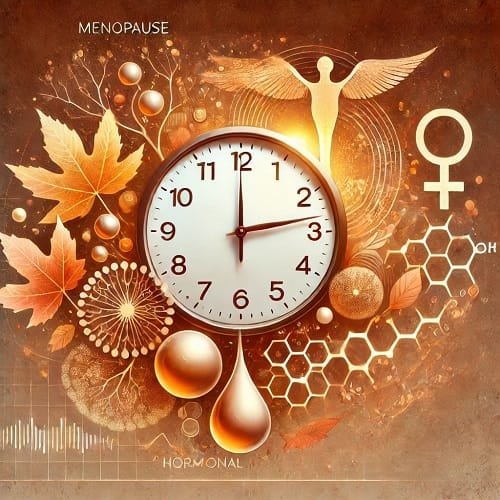Introduction
Navigating through menopause is a significant and often challenging phase in a woman’s life. The emotional changes that occur during this time can sometimes feel overwhelming, especially when it comes to relationships. One of the most common and difficult experiences is the feeling of anger towards husbands. This can manifest as frustration, irritability, or an inability to communicate effectively, leading to tension in the relationship. For many women, menopause symptoms, including hot flashes, mood swings, and sleep disturbances, can intensify these feelings.
Understanding the emotional toll of menopause and anger towards husband is essential for both partners to maintain a strong, healthy relationship. Often, husbands may feel confused or helpless when faced with their wife’s sudden emotional outbursts, while women may feel misunderstood or unsupported. The key is to acknowledge these changes and learn how to manage them together.
In this article, we will explore the causes behind menopause and anger towards husband, offer practical tips for women on how to cope, and provide advice for husbands on how to offer support during this challenging time. Whether you’re experiencing relationship struggles or simply want to understand the emotional journey of menopause better, this guide will provide helpful insights to strengthen your relationship during this pivotal stage in life.
Table of Contents
What Happens During Menopause?

Menopause is a natural biological process that marks the end of a woman’s menstrual cycles, typically occurring between the ages of 45 and 55. However, the changes that accompany menopause symptoms often begin much earlier, during a phase called perimenopause. During this time, the body undergoes significant hormonal fluctuations that can trigger a variety of physical and emotional shifts.
One of the most noticeable effects of hormonal changes is the impact on mood regulation. As estrogen and progesterone levels drop, women may experience an increase in irritability, anxiety, and emotional upheaval. This can result in heightened mood swings that are difficult to manage, both for the woman herself and her loved ones. As a result, menopause and anger towards husband can become more pronounced, with women sometimes feeling frustrated by the physical changes they are undergoing and how these changes affect their relationship.
In addition to mood swings, common menopause symptoms such as hot flashes, night sweats, and sleep disturbances can further exacerbate feelings of frustration and stress. The constant cycle of waking up in a sweat or feeling fatigued from lack of sleep can leave women feeling out of control, which may translate into irritability towards their partners. Moreover, anxiety and feelings of depression are not uncommon during this time, which can affect a woman’s ability to engage in calm, meaningful conversations with her husband.
These emotional upheavals often lead to misunderstandings in communication in marriage, as the hormonal changes are not always immediately clear to both partners. Husbands may struggle to understand why their wife is suddenly more irritable or angry, while women may feel unsupported or isolated in their emotional state. This breakdown in communication can result in further stress and conflict, leaving both partners feeling disconnected and frustrated.
Ultimately, understanding the biological changes that occur during perimenopause and menopause can help couples manage these challenges more effectively. Recognizing that these emotions are often beyond a woman’s control, and that menopause and anger towards husband are temporary, can foster compassion and patience in relationships.
Understanding Anger During Menopause

Menopause is a time of significant physical and emotional transformation, and one of the most common emotional responses women experience is anger. However, the anger triggers during this phase are not always straightforward, and often stem from a combination of factors. Understanding these causes can shed light on why women may feel irritable or frustrated, particularly in their relationship with their husbands.
At the root of anger during menopause are the emotional turmoil and physical discomfort that often accompany the transition. The fluctuating levels of hormones, such as estrogen and progesterone, directly impact a woman’s emotional regulation. This hormonal imbalance can make it difficult for women to manage feelings of irritability and frustration, as their bodies no longer respond the same way. Physical discomfort—such as hot flashes, sleep deprivation, and fatigue—can compound these feelings. Lack of rest and constant discomfort often leave women feeling overwhelmed and out of control, which can easily spill over into anger towards their husbands.
Additionally, self-image changes can contribute to heightened emotional reactions during menopause. As women experience shifts in their physical appearance, weight changes, and energy levels, they may struggle with a loss of confidence or even feelings of inadequacy. This frustration with their body can manifest as irritability, particularly in interactions with their partners. Menopause can feel like a period of loss—loss of youth, vitality, and sometimes even identity—which can be difficult to navigate. The mental health implications, including feelings of depression and anxiety, can only intensify this emotional state, making it harder to keep anger in check.
Another major contributor to anger during menopause is stress. The pressures of daily life—whether related to work, family, or personal expectations—can feel magnified when combined with the physical and emotional shifts that menopause brings. Stress, when coupled with fluctuating hormones, can lead to more intense and frequent outbursts of anger. The lack of patience many women experience can cause small annoyances to feel like major issues, triggering emotional reactions that might seem disproportionate to the situation at hand.
For husbands, these emotional shifts can be difficult to understand. Many men may feel confused or helpless as they try to navigate the emotional landscape of their wives during menopause. They may find it hard to connect with their partner or know how to provide the support their wife needs. The lack of communication around menopause-related struggles can leave husbands feeling isolated in their own emotional response, unsure of how to best cope with the situation. Relationship dynamics may change, creating tension and distance if both partners do not take the time to understand the cause of the anger and frustration.
Ultimately, menopause and anger towards husband can strain the relationship, but with understanding and open communication, couples can work together to navigate this challenging period. Both partners must recognize that the anger women feel is not directed at them personally, but is often the result of the complex interplay of emotional, physical, and hormonal changes.
How Menopause Affects Communication in Marriage

One of the most significant ways menopause and anger towards husbands impact a relationship is through communication breakdown. As hormonal shifts affect a woman’s emotional state, she may struggle to express her feelings clearly or may react impulsively, leading to miscommunication. For instance, what might seem like a small frustration to one partner can become a source of intense anger for the other. Women may find it difficult to articulate their emotions due to the mental and physical strain they are under, which can lead to responses that may appear irrational or exaggerated. This communication gap often creates relationship tension and further escalates the emotional distance between partners.
Another contributing factor to the breakdown in communication is the lack of empathy from either side. Menopause and anger towards husband are often misunderstood due to the lack of awareness around the emotional and physical challenges women are experiencing. Husbands may not recognize the significance of symptoms such as fatigue, mood swings, or hot flashes, making it difficult for them to empathize with their wives’ emotional states. Conversely, women may feel unsupported or alienated if their husbands do not acknowledge the depth of the emotional disconnect she is feeling. Without a shared understanding, communication becomes strained, and each partner may feel misunderstood.
For husbands, the experience can be equally frustrating. When they are met with anger or irritability without clear explanation, they might feel confused or rejected. This can lead to a sense of emotional distance or isolation, as they are unsure how to respond or how to help their wives navigate these changes. The marriage dynamics shift during this time, as both partners try to adjust to the new emotional landscape. Husbands may struggle with feeling distant or disconnected, unsure of how to reestablish a sense of closeness or support without making matters worse.
Ultimately, effective communication is crucial in managing menopause and anger towards husbands. Both partners need to make an effort to understand each other’s struggles and approach the situation with patience, empathy, and an open mind. Rebuilding the lines of communication can help both partners feel heard and supported, fostering a stronger, more resilient relationship.
ALSO READ
How to Treat Menopause Back Pain: Effective Solutions & Tips
Can Menopause Cause Nausea? What Women Should Know
Abortion and Endometriosis: What Every Woman Should Know
Coping Strategies for Women

Managing menopause and anger towards husbands can be a daunting task, but there are effective coping strategies that women can adopt to help mitigate the emotional and physical challenges that arise during this phase. By focusing on self-care, mental well-being, and communication techniques, women can better manage their anger and enhance their overall emotional health. Below are some practical ways to cope with menopause-related anger and improve relationship dynamics.
Self-Care Practices
One of the most powerful tools in managing menopause and anger towards husbands is investing time in self-care. Prioritizing your well-being can make a world of difference in regulating emotions. Adequate sleep is essential, as poor sleep due to night sweats or insomnia can exacerbate irritability and frustration. By creating a relaxing bedtime routine or improving the sleep environment, women can help reduce these disruptions and wake up feeling more refreshed. Regular physical activity also plays a critical role in regulating mood and boosting overall physical health. Exercise not only helps with weight management but also increases endorphins, which improve mood and help reduce stress. Incorporating yoga, walking, or light stretching can help women feel more balanced and at peace with themselves, which, in turn, can ease anger and frustration.
Stress management is another vital component of self-care. Menopause symptoms can often feel overwhelming, but learning to manage stress through deep breathing exercises or relaxation techniques can greatly reduce emotional outbursts. Taking time to unwind and practice stress management can help prevent emotional overload, allowing women to approach situations with a clearer and calmer mindset.
Mindfulness and Meditation
Mindfulness and meditation are highly effective tools for managing irritability and stress. These practices encourage women to focus on the present moment, allowing them to step back from emotional triggers and avoid knee-jerk reactions. Mindfulness can help reduce the emotional intensity that often accompanies menopause, making it easier to handle difficult conversations with partners. Meditation, on the other hand, promotes a sense of calm and emotional clarity. Even just 10-15 minutes a day can reduce overall anxiety and help women approach their emotions with more patience and understanding. When practiced consistently, these techniques can enhance emotional regulation, which is essential in managing menopause and anger towards husbands.
Seeking Help: Therapy and Emotional Support
Sometimes, the emotional challenges of menopause can feel too overwhelming to handle alone. Seeking therapy—whether through individual counseling or couples therapy—can be incredibly helpful. Therapy provides a safe space to explore the underlying causes of anger, frustration, and emotional distress. A professional can help women process these emotions and develop effective coping strategies. For couples, therapy can facilitate better communication, teaching partners how to express their feelings and support each other through this difficult time. Emotional support from a therapist or counselor can also help women gain insights into their emotions and manage the feelings of isolation that often come with menopause.
Communication Techniques for Reducing Conflicts
In addition to therapy, adopting communication techniques can significantly improve the quality of interactions with husbands during menopause. First, it’s important to express feelings calmly and respectfully. When women feel anger rising, it can help to pause and take a deep breath before responding. This moment of stillness allows for more measured, thoughtful communication. Using “I” statements—such as “I feel frustrated when…”—rather than “You never…” can also prevent husbands from feeling blamed or defensive. Women should aim to express their emotions honestly but without overwhelming their partner. Another helpful approach is to schedule regular check-ins to discuss emotions and relationship dynamics, providing both partners with an opportunity to understand each other’s needs better. These conversations can help address small issues before they escalate into larger conflicts.
By incorporating these coping strategies—focusing on self-care, practicing mindfulness, seeking professional support, and using effective communication techniques—women can significantly reduce the negative impact of menopause and anger towards husbands. These approaches not only improve emotional well-being but also strengthen relationships, fostering greater understanding and empathy between partners during a challenging life transition.
Coping Strategies for Husbands

When it comes to menopause and anger towards husbands, it’s essential for husbands to understand that their role is crucial in helping their wives navigate this challenging phase. The emotional and physical shifts women experience during menopause can often lead to irritability and anger, but with the right support, husbands can play a key part in reducing tension and fostering a healthy relationship. Below are strategies husbands can adopt to actively support their wives during this time.
Supporting Your Wife with Empathy and Patience
The most important thing a husband can do during menopause is to show empathy and patience. Understanding that the emotional turmoil, hormonal changes, and physical discomforts like hot flashes or sleep disturbances can contribute to mood swings is vital. It’s not about “fixing” the problem, but rather offering support and reassurance. Husbands should try to see things from their wife’s perspective, recognizing that this is a period of emotional and physical upheaval. By showing understanding and responding with kindness, husbands can alleviate much of the relationship tension and prevent misunderstandings. In doing so, they can create a safe space for their wives to express their emotions without fear of judgment.
Active Listening: The Key to Reducing Conflict
Another effective coping strategy for husbands is active listening. When women express their frustrations, it’s easy for men to feel defensive or overwhelmed, especially when the emotions seem intense or unpredictable. However, instead of reacting immediately, husbands should focus on listening attentively and empathetically. Active listening involves not just hearing the words, but also understanding the feelings behind them. It’s important to avoid interrupting or offering solutions right away. Often, what women need most during this time is simply to feel heard and validated. By giving their wives space to express their feelings without interruption, husbands can help reduce the emotional intensity and diffuse potential conflicts. Active listening encourages open communication, making it easier to address the root causes of menopause and anger towards husbands.
Seeking Couples Therapy for Better Communication
For many couples, navigating the emotional landscape of menopause can be challenging, and sometimes professional guidance is needed. Couples therapy can be an invaluable tool in improving communication and understanding. A therapist can help both partners recognize and address the underlying causes of frustration and anger, helping them develop better strategies for coping. Therapy can also teach couples how to communicate more effectively, fostering an environment where both partners feel supported. Seeking relationship advice from a professional can create a safe space for difficult conversations and help husbands understand how their wife’s emotional state is impacting the relationship. By investing in couples therapy, both partners can gain a deeper understanding of each other’s needs and improve their emotional connection.
Promote Healthy Conversations and Avoid Escalation
Finally, it’s essential for husbands to help foster positive communication during menopause. Menopause and anger towards husbands often stem from emotional miscommunication or misunderstandings. Husbands can promote a healthy dialogue by approaching sensitive topics with care and respect. Instead of dismissing their wife’s feelings or reacting defensively, they should aim to respond calmly and thoughtfully. It’s important to avoid escalating the situation by remaining patient and understanding. Asking open-ended questions like, “What can I do to help?” or “How are you feeling right now?” shows a genuine interest in their wife’s emotions and helps shift the focus from conflict to support. Additionally, scheduling regular “check-ins” with each other can help both partners stay in tune with each other’s needs, preventing small issues from snowballing into larger problems.
In conclusion, husbands play a critical role in reducing anger during menopause by showing empathy, practicing active listening, seeking professional guidance through couples therapy, and fostering positive, non-defensive communication. By adopting these strategies, husbands can create a supportive environment that helps ease the emotional burdens of menopause, making the relationship stronger and more resilient.
Benefits of Joint Coping

When it comes to menopause and anger towards husbands, the benefits of working together as a team are immeasurable. Shared understanding and mutual support during this time can not only help reduce conflict but also enhance the overall bond between partners. By facing this challenge together, couples can deepen their connection and grow stronger as a unit.
Shared Experience and Strengthened Bonds
One of the key benefits of joint coping is the opportunity for both partners to engage in a shared experience. Understanding the emotional and physical challenges of menopause can foster empathy and create a stronger sense of partnership. Instead of feeling isolated, women may feel more supported by their husbands, while husbands can gain a clearer understanding of what their wives are going through. This sense of togetherness can lead to relationship growth by encouraging open conversations and emotional sharing, allowing both partners to feel heard and understood. When couples approach menopause as a shared journey, it strengthens the foundation of their relationship, leading to deeper mutual respect and affection.
Growth Through Challenges
Though menopause may be a time of emotional upheaval, it is also an opportunity for relationship growth. The challenges of menopause and anger towards husbands can serve as a catalyst for personal growth and resilience. When both partners approach these difficulties with patience and understanding, they learn how to navigate conflict more effectively, building new communication skills and problem-solving strategies. This growth isn’t just limited to the individual—it extends to the relationship. Couples who learn to handle such significant emotional and physical changes together emerge stronger, with a deeper commitment to one another. The ability to weather the storm of menopause together can make couples feel more connected, unified, and equipped to face future challenges as a team.
Teamwork and Mutual Support
Ultimately, menopause is a phase that can benefit from a teamwork approach. Both partners supporting each other through mutual support helps create a balanced and harmonious relationship. Instead of viewing menopause as an individual issue, couples should see it as a phase that requires partnership. This collaborative mindset encourages both partners to take responsibility for their emotions and actions, ultimately fostering a relationship built on shared understanding and compassion. The effort to work together strengthens the bond, and the relationship may emerge from this experience even more resilient than before.
By embracing teamwork and recognizing the benefits of shared understanding, couples can navigate the emotional turbulence of menopause with grace and come out stronger on the other side.
Conclusion and Final Thoughts
The journey through menopause and anger towards husband is undoubtedly challenging, but it is also an opportunity for growth, understanding, and deeper emotional connection. By recognizing the root causes of menopause-related anger—such as hormonal changes, stress, and emotional upheaval—women can better navigate their emotions. At the same time, husbands who approach this period with empathy, patience, and support can significantly ease the tension in the relationship.
Both partners must actively participate in finding relationship solutions that foster marital health. Women can focus on self-care, mindfulness, and stress management, while husbands can practice active listening and emotional support to create a nurturing environment. Seeking menopause support, whether through therapy, open communication, or shared coping strategies, can help couples manage this transition effectively.
While menopause can create tension, it does not have to weaken a relationship. Instead, when approached with patience and understanding, it can strengthen the emotional bond between spouses. By working together and prioritizing mutual support, couples can emerge from this phase with a stronger, healthier, and more resilient marriage.
Frequently Asked Questions (FAQ)
1. Why am I so angry during menopause?
Menopause causes significant hormonal changes, leading to irritability, mood swings, and emotional distress. Additionally, sleep disturbances, stress, and physical discomfort can intensify frustration, making anger more frequent and difficult to control.
2. How can I stop taking my menopause anger out on my husband?
Managing menopause and anger towards husbands requires self-care, stress management, and mindfulness techniques. Engaging in regular exercise, therapy, or meditation can help regulate emotions. Open communication with your spouse about how you’re feeling can also prevent unnecessary conflicts.
3. What can my husband do to support me during menopause?
Husbands can offer emotional support by practicing active listening, showing empathy, and remaining patient. Understanding that menopause is a difficult transition can help husbands provide reassurance and encouragement while avoiding defensive reactions.
4. Is it common for menopause to affect my relationship with my partner?
Yes, many couples experience relationship tension during menopause due to emotional fluctuations and miscommunication. However, understanding the root causes and working together to navigate the changes can help strengthen the relationship rather than weaken it.
5. Should we seek therapy during menopause-related issues in our marriage?
If anger, frustration, or emotional disconnect becomes overwhelming, seeking menopause counseling or couples therapy can be beneficial. A therapist can provide relationship tips and coping strategies to help both partners communicate effectively and maintain a healthy marriage.
By understanding and addressing the challenges of menopause and anger towards husbands, couples can ensure that their relationship remains strong, loving, and supportive throughout this transition.






